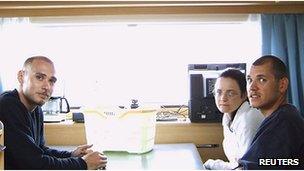Neo-Nazi murders: Beate Zschaepe charged
- Published

Uwe Mundlos, Beate Zschaepe and Uwe Boehnhardt were believed to be the cell's only members
An alleged member of a German neo-Nazi cell has been charged over the murders of 10 people, mostly immigrants, over the course of a decade.
Beate Zschaepe, who prosecutors say helped found the National Socialist Underground (NSU), faces life imprisonment if convicted.
Two of her alleged accomplices were found dead last November.
The case prompted stinging criticism of the German security services and led to high-level resignations.
The NSU had been undetected until Beate Zschaepe blew up her rented flat in eastern Germany a year ago and gave herself up to police.
The bodies of her alleged accomplices, Uwe Mundlos, 38, and Uwe Boenhardt, 34, were discovered in a caravan in an apparent double suicide.
The far-right cell is blamed for the deaths of nine men of Turkish or Greek origin and a German policewoman. It has also been linked to two bomb attacks and a number of bank robberies.
'Insidious deeds'
Prosecutor Wolfgang Range said Beate Zschaepe had also been charged with helping to found the terrorist organisation and multiple other crimes.
"The members of the NSU planned their indiscriminate and insidious deeds together," he said in a statement on Thursday.
"Uwe Boenhardt and Uwe Mundlos carried out the murder attacks and the robberies. The accused [Beate] Zschaepe gave the NSU the appearance of legality and normalcy towards the outside."
Prosecutors said the execution-style killings allegedly carried out by the NSU spread fear in the immigrant community and aimed to convince foreigners to leave Germany.
They said four other men had also been charged with various crimes for allegedly helping the NSU, including providing the murder weapon.
The killings sparked a crisis in Germany's intelligence services, because for several years the deaths had wrongly been blamed on warfare between rival immigrant gangs.
A lack of co-ordination between the 32 police and intelligence agencies has been highlighted as a key reason why the Zwickau cell was not discovered sooner.
The murders prompted German ministers to approve plans for a national register of far-right extremists.
- Published7 December 2011
- Published16 November 2011